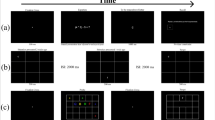Abstract
Nicotine has been shown to affect attentional and mnemonic processes. However, whether these effects are due to changes in perceptual and/or motor aspects of the tasks is not at all clear. This study tested the hypothesis that nicotine from cigarette smoking has differential effects on perceptual and motor processes, as reflected by event-related potentials (ERPs) and reaction times (RTs), respectively, and that perceptual effects may be specific to changes in working memory. ERPs, RTs and performance accuracy were recorded from smokers and nonsmokers during a serial-probe recognition memory task in which lists of words or “memory sets” were followed by a probe word that was either in-set or out-of-set. Smokers were tested in a “smoking” and a 12-h “deprived” condition. Smoking-smokers and deprived-smokers exhibited fast RTs to in-set and out-of-set probes relative to a group of nonsmokers. They exhibited even faster RTs when the in-set probe word matched the first or last item in the memory set. Thus, smokers as a group showed enhanced primacy and recency effects suggesting that smoking specifically facilitates processes related to the motor output aspects of working memory. Different effects characterized the electrophysiology. Larger P300s were recorded to in-set compared to out-of-set probes by both subject groups. Smoking smokers exhibited enhanced P300s to both types of probes. When smokers abstained for 12 h (deprived smokers), the differences in P300 amplitude were reduced but not eliminated. Smoking smokers exhibited faster P300 latencies to in-set probes, while deprived smokers showed delayed latencies relative to nonsmokers. Primacy and recency P300 effects characterized nonsmokers and deprived smokers. However, this relationship was reversed in the Smoking condition. These results support the hypotheses that nicotine has distinct effects on memory-related perceptual and motor aspects of working memory. The increase in efficiency of the memory search with nicotine is consistent with the functional role of the cholinergic system in maintaining a state “appropriate for efficient information processing.”
Similar content being viewed by others
Author information
Authors and Affiliations
Additional information
Received: 12 April 1997/Final version: 4 March 1998
Rights and permissions
About this article
Cite this article
Pineda, J., Herrera, C., Kang, C. et al. Effects of cigarette smoking and 12-h abstention on working memory during a serial-probe recognition task. Psychopharmacology 139, 311–321 (1998). https://doi.org/10.1007/s002130050722
Issue Date:
DOI: https://doi.org/10.1007/s002130050722




